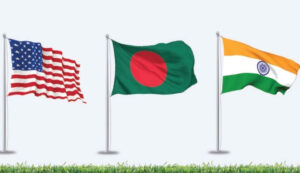
AKM Zakir Hossain :
IN THE complex tapestry of South Asian geopolitics, India finds itself at a critical juncture with its neighbour Bangladesh. Recent political developments in Bangladesh, marked by a crackdown on opposition leaders and activists, raise concerns about the stability and democratic values of the nation. As India contemplates its role in the region, a careful examination of its approach is imperative.
Call for neutrality
INDIA, to look to be a responsible regional player, needs to reconsider its stance on Bangladesh and the Awami League. While diplomatic ties are essential, overt support for any political faction may undermine India’s reputation as a neutral observer. It is crucial for India to foster friendly relations not just with the government but with the people of Bangladesh. The recent surge in anti-Indian sentiment highlights the need for a more nuanced approach, one that prioritises the interests and sentiments of the Bangladeshi population.
Supporting authoritarian leaders and overlooking questionable electoral practices risks alienating a significant portion of the Bangladeshi populace. India must recognise that a stable and friendly Bangladesh is in its best interest and this stability should rest on democratic foundations. By advocating inclusive governance and respecting the democratic aspirations of the people, India can contribute to the long-term stability of the region.
Role of USA in nurturing democracy
THE United States, with its global influence, should play a pivotal role in restoring democracy in Bangladesh. Concerns about authoritarianism under prime minister Sheikh Hasina’s leadership should be addressed through diplomatic channels. The United States, in its strategic considerations, must prioritize the promotion of democratic values over short-term geopolitical gains.
A neutral and inclusive caretaker government, as advocated by the opposition, is essential for conducting free and fair elections. The United States can leverage its influence to facilitate negotiations between the government and opposition forces, working towards a political solution that reflects the will of the Bangladeshi people. This intervention aligns with Washington’s broader strategy of promoting democracy and balancing geopolitical interests in the region, particularly in its strategic competition with China. Bangladesh may be little, but the United States now views it as strategically significant. The nation should not be left to its fate by Washington once more.
Socio-political and economic consequences
THE socio-political and economic consequences of the current situation in Bangladesh are far-reaching. Marginalising mainstream opposition parties not only undermines democratic principles but also creates a vacuum that radical elements may exploit. According to the US Institute of Peace report on extremism highlights ‘political exclusion’ as one of the conditions for extremism. In addition, the economic leverage that India enjoys from Bangladesh is remarkable. Indians remit $4 billion from Bangladesh.
Economically, Bangladesh is facing pressing issues such as dwindling foreign exchange reserves and rising inflation. The inflation in October 2023 was 9.93 per cent while the foreign exchange reserve reached $20,710.1 million. The political turmoil further exacerbates these challenges, jeopardising the nation’s economic stability. A democratically elected government, representing the will of the people, is essential for addressing these economic woes through transparent and accountable governance.
In conclusion, India’s approach to its neighbours, particularly Bangladesh, should be characterised by neutrality and respect for democratic values. The United States, as a global proponent of democracy, can contribute significantly to the restoration of democratic processes in Bangladesh. The socio-political and economic consequences of the current situation necessitate collaborative efforts to ensure a stable, democratic, and prosperous future for Bangladesh and the broader South Asian region.
AKM Zakir Hossain is a UK-based Bangladeshi teacher, researcher, human rights activist and former military officer.
New Age









